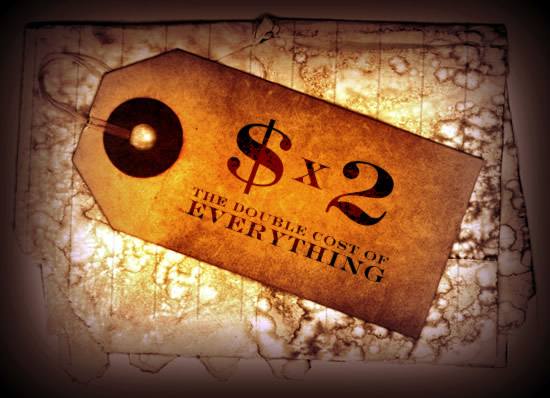The Double Cost of Everything
Feb 5, 2009 Finance

Everybody knows that saving money is smart. Here’s why spending money is stupid (or at least affects you more than you’re trained to think).
When I was in college, I worked two part-time jobs. Together, the money I made from them pretty much covered my rent, food, and activities each month—but that still left me with the daunting hurdles of tuition and books to pay for each semester. While most students were applying for grants and scholarships, I turned to credit cards and float time on my personal checks.
As I tried to pay down my debt—throwing loads of cash at it, I just wasn’t making a dent. No matter how much money I was funneling toward my credit card balances, they never reflected the amount of money I really was paying toward the debt. This became one of the greatest lessons I learned in personal finance, something I call “The Double Cost of Everything.”
When I explained the principle to me wife, she said “Yeah. Most people call that ‘opportunity cost.’” Opportunity cost is probably the only subject of economics (a class I took twice) that I actually understood. It’s a fascinating subject, and if you’re not familiar with the concept (or even if you are), reading its entry on Wikipedia is a great refresher.
Opportunity cost is the value of the next best (or better) thing you could do with your money. “Double cost” is saying that because you’re spending, you’re losing your money plus your power to choose that next-best option. This loss equals 2x the dollar amount you’re paying out.
When combined with opportunity cost, the theory gives you a much more clear impression of the importance each financial decision really holds.
How It Works
When I first realized my theory, I was starting to see that if I put 400 dollars toward my debt, it wouldn’t make much of a difference in the balance on my card. The debt was too large, and when including interest, wouldn’t show a true $400 paydown.
On the other hand, if I took the $400 and spent it on a new stereo system, not only would I lose my $400, but my debt load would increase. When in debt, the $400 didn’t have the power to make me $400 richer, but if spent, it would make me nearly $800 poorer. How? Because once I used that purchasing power, it was spent. Gone. And not only was it gone, but my ability to pay down my debt was also lowered by $400. That’s the double cost of spending.
It’s not strict mathematics and no company will include opportunity or “double” costs on their balance sheet, but in the real world—when we’re dealing with humans, debt, minds, and dollars, the money you spend has twice the impact (or more as I’ll point out next) as the dollar value we naturally attach to it.
Double Cost +
When a person carries debt, additional factors push the effect of spending to more than double. Not only are you spending the money and losing power to pay down debt, but you’re also preserving the principal that you’re being charged interest on. In effect, spending the $400 is also paying 15% (or whatever your rate is) interest on it and adding to your debt horizon!
In addition, because you spent your money, if you have a new required expense (utilities, mortgage, whatever), you may have to pay that expense on credit, making the cost of that $400 even steeper.
Spending Isn’t All Bad
Of course spending money isn’t evil. If you never spend money, there’s really no reason to have any in the first place. But spending wisely, and realizing the double cost of everything will help you to prioritize and see your costs for what they really are (think double).
Responsibility
Hopefully looking at money in this way will help us to realize that we have a responsibility to save, spend, and invest wisely. If we have a family, they depend on us. And if we want to be contributors to society (which all good citizens should), we must have the means to actually contribute.
Being responsible goes a long way in cutting debt and building real wealth. Once we realize the true impact of our financial decisions, it becomes easier to make decisions that will prepare us for good times and bad.
Once I learned my lesson, I started a savings account and put a small percentage of everything I earned into it. Some would argue that the time to save comes after debts have been paid. But now that I understood my human nature, I knew that I needed to start a habit.
I also began paying down my debt with everything that wasn’t going to savings or reasonable living expenses. Today (despite the economy) I feel safe, secure, and prepared. I credit that security to my discovery of the true price attached to each expense—the double cost of everything.
Tags: double cost, Finance, money

